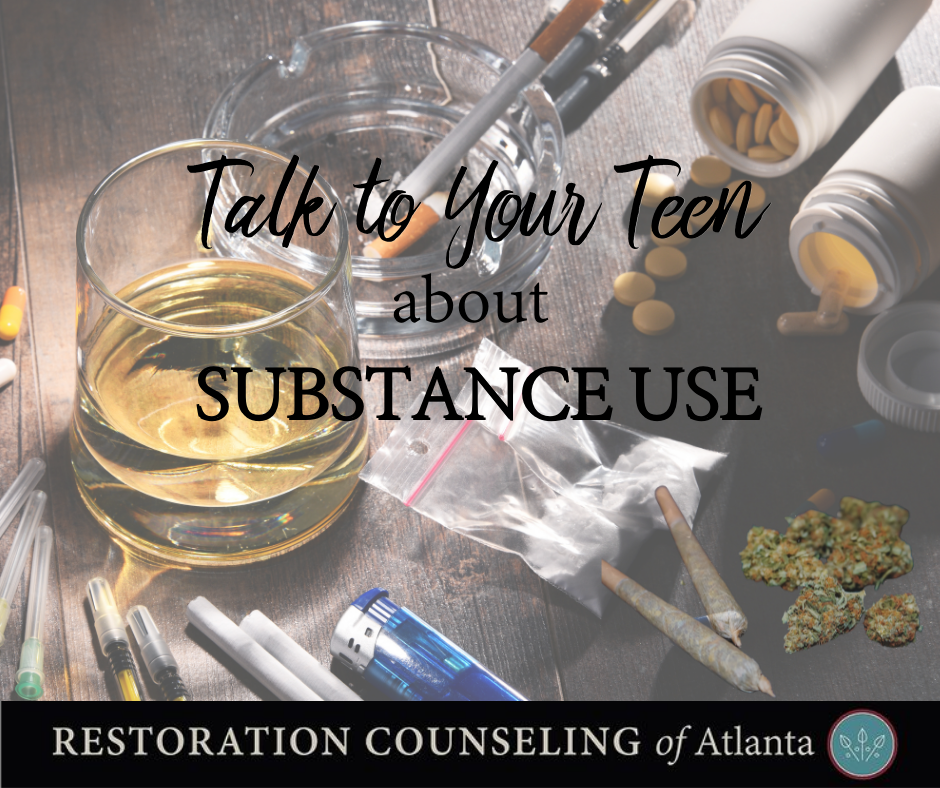Talk to your teen about substance use. Start early. Talk often. Make it a natural part of an ongoing conversation about health and family values. Be open. Speak honestly. Model the behavior you expect from your teen. If you need help, get it. Do not be intimidated, and don’t give up. Does this seem easier said than done? If so, read on!
Why Talking is Critical
Talking to your teen about substance use is not always easy, but it is essential to protect your child and prepare your teen for the future. Substance use is widespread. The CDC reports that by 12th grade, 66% of students try alcohol, 50% try marijuana, 40% percent try cigarettes, and 20% try non-prescribed prescription medications.
The teen’s brain is not the same as an adult’s. In a teen, the brain’s prefrontal cortex, which is the part that helps with inhibition (stops us from doing dumb things), is not fully developed. As a result, teens may seem mature and perfectly reasonable in one minute. Then, in the next, they can do something extraordinarily out of character or even dangerously impulsive. Walking alongside teens as they grow and develop is not for the faint of heart. But take courage, you can do this!
Watch For and Create Opportunities
With its rapidly changing neural circuits, the developing teen brain has an affinity for peer social acceptance and the tendency for intense mood swings and impulsivity. Their vulnerable brain is attracted to and damaged by substance use. As a parent or guardian of a teen, we must see that conversations happen often and in different contexts. Then, the teen who hears you talk can begin to listen. Intentionally watch for and create healthy opportunities for open conversation about substance use. These actions demonstrate that you are available and approachable. The teen will know that substance use is a topic that is important to talk about and understand.
Provide natural opportunities for conversations with teens by staying:
- Curious – Ask your teen about what they know and believe about substance use.
- Present – Carefully listen as teens talk about their friends and activities. Ask questions.
- Connected – Set aside time to listen to your teen’s thoughts and concerns intentionally
- Current – Use movies, information found on social media, and news stories as segues to deeper conversations
- Safe – Explore “what if you encountered” scenarios with your teen. Communicate that you are open to help and available to answer any questions your teens may have about substance use.
- Social – Intentionally surround your teen and provide your teen with opportunities to develop relationships with safe adults. They may need someone to communicate with about their concerns. This is especially important if they don’t want to approach a parent or guardian. These might include, for example, youth group leaders, family friends, etc.
What Teens Need to Know
Detailed information about substance use and abuse is widely available on the internet. Like those listed in the “Resources” section of this article, many resources exist to help parents and guardians educate themselves about the details and stay informed. General topics that are essential for teens to know include:
- Dangers of substance use and abuse – The risks of substance use and abuse are varied. Help your teen, in an age-appropriate way, understand that substance use leads to brain damage and addiction. It may also increase the risk of many physical, psychological, and social problems.
- Where and when they may encounter substances – Help your teen identify where and when they may encounter substances in your community. Teens often begin using in social settings. Encourage your child to socialize in places where it is not likely that substances are available.
- How to avoid temptation or social pressure to use substances – Equip your teen with the skills necessary to be assertive and leave a situation where they feel pressured or tempted to use substances.
- Why people continue to use substances – Substances alter moods and are often used to cope with uncomfortable emotions. Ensure your teen is equipped with the skills necessary to cope with stress and uncomfortable feelings. Let them know there are alternatives to substances.
- History of substance abuse in the family – Be prepared to answer personal questions about your own substance use or substance use by other family members. Model the behavior you expect from your teen. If you used or abused substances in the past, consider how you want to share this information with your teen. What do you want them to learn from your experiences? Teach them that addiction is a family disease, and some people are more genetically susceptible to becoming addicted to substances.
- How to get help – Let your teen know that you are approachable and safe. Communicate a non-judgmental willingness to assist them in finding help if they or their friends are using substances. Equip them with the number of the Substance Abuse and Mental Health Administration’s helpline: 1-800-662-HELP.
Resources to Help With the Conversation
Stay current about substance use and abuse-related information. It’s easy! Check out the following resources for additional helpful information on how to communicate with your teen about substances.
- Substance Abuse and Mental Health Services Administration (SAMHSA): Talk They Hear You Campaign: https://www.samhsa.gov/talk-they-hear-you
- Center for Disease Control and Prevention: https://www.cdc.gov/ncbddd/fasd/features/teen-substance-use.html
- https://www.mayoclinic.org/healthy-lifestyle/tween-and-teen-health/in-depth/teen-drug-abuse/art-20045921
 Written by Andrea Brandt, NCC, APC
Written by Andrea Brandt, NCC, APC
andrea@restorationcounselingatl.com, ext. 154
Andrea received a Master of Arts degree in Clinical Mental Health Counseling from Richmont Graduate University, a Christ-centered university, and currently serves clients in Georgia as an Associate Professional Counselor under supervision and direction. She has continuing education and experience working with addiction and family-related issues and applying cognitive-behavioral therapy (CBT), Exposure and Response Prevention (ERP) for OCD, and Telemental health.

